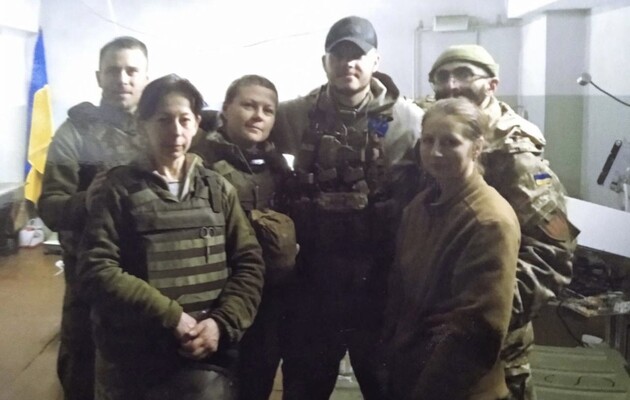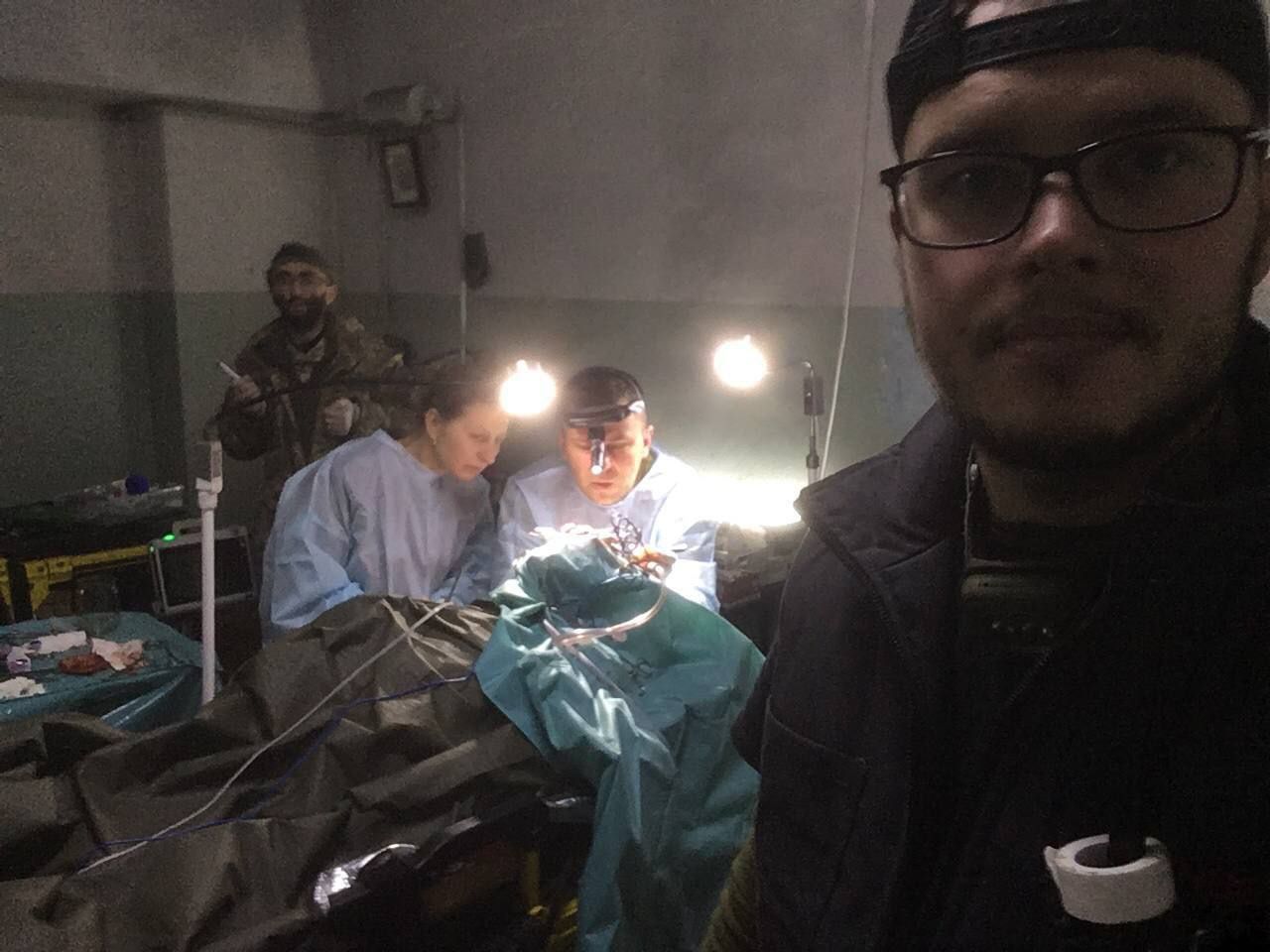Military Medic Olha Shapovalova: “In captivity, they said Ukraine no longer exists. We did not believe and knew we would definitely return home.”

article by Yelyzaveta Chyzhyk, editor, ZN.UA
Military medic Olha Shapovalova was one of those who went through the real hell of this war. The first explosion on February 24, the bombing of Mariupol, thousands of wounded, hundreds of amputations and laparotomies in the bunker tunnels of the Ilyich Iron & Steel Works plant, followed by six months in Russian captivity. Hematomas, interrogations under electric current and the only answer to occupier’s “no-one-needs-you” manipulation: “No, they do. I am sure that now they are exchanging those who need it more; the wounded. We can wait.”
Olha had to wait until October 17. It was then that another large-scale exchange of prisoners took place between Ukraine and the Russian Federation. It was an emotional and really special occasion: 108 women returned to Ukraine from captivity.
Olha Shapovalova recounts everything she had to go through — from the first explosion in Mariupol to the first step on Ukrainian soil after being captured — in the interview with ZN.UA.
The first months of the full-scale war. Mariupol
— I’m a doctor by training,” says Olha. “I worked at Mariupol Military Hospital No. 555 and held the position of operating room nurse of the surgery department. On February 21, 2022, we were urgently summoned to the hospital. At that moment, Russia recognized the "DPR" and "LPR" within the boundaries of entire Ukrainian regions. We knew it was necessary to brace for the worst. Moreover, it was all over the news.
Since February 21, we were at the hospital in barracks, intensively preparing materials in case of possible hostilities. On February 23, according to instructions, we were allowed to go home for two hours. We took the necessary things and food and returned to the hospital. At that time, we could not have imagined that in just a few days this place would turn into a real hell. And that I would not return home.”
— ZN: Mariupol quickly became the hottest spot. What happened in the first days of the invasion in the city?
— On February 24, we, as all Ukrainians, heard a loud explosion. It was clear: it started. We changed quickly and got down to work.
There were more and more people in the hospital, so it was necessary to re-equip some rooms and turn them into additional operating rooms. This allowed us to operate on five to six people at the same time. At first, military personnel entered the hospital, later civilians, including children. People applied for help of various degrees. Someone needed surgery, someone asked to be given medication, bandaged and have their blood pressure measured. We worked in this non-stop mode until March 16. The workload was so heavy that the doctors didn’t even think about sleep.
Our hospital is located next to the Neptune pool, so its territory was repeatedly shelled. On March 16, an aerial bomb landed on the intensive care unit. I was in the operating room with my colleagues at that time. We were all swept away by the blast wave. The bags used to cover the windows came off, and we were instantly covered with shards of glass. That day the hospital was completely ruined.
On March 16, the Russian military also carried out an airstrike on the Mariupol Drama Theater. I remember how, 30 minutes after the strike, a woman in her fortieth week of pregnancy was brought to us. She had an open hip fracture. We gave her the necessary first aid right in the corridor of the destroyed hospital. After that, a car arrived and took the victim to the clinic.
The next day, part of the medical team from the 555th hospital was sent to Metallurgical Combine Azovstal, our team went to the Ilyich plant. At that time, we did not even understand what day it was outside the window, since, of course, no one followed the calendar.
At the Ilyich plant, we lived in bunker tunnels and simultaneously operated on the injured. The corridors were in such a deplorable condition that water was constantly dripping from the ceiling. In order for it not to fall on the wounded, we had to cover people with oilcloth with our own hands.
Later on, we moved to another bunker – a bigger and stronger one. We had up to 200 wounded there. We operated on them, bandaged them. They worked mostly with seriously injured patients; in terrible bunker conditions, they repeatedly performed laparotomies, amputations of limbs, operations on the face and chest, bandages under anesthesia, primary surgical treatment. They also performed a neurosurgical operation on the open brain. The patient survived and is currently undergoing rehabilitation. In short, we did everything we could. It was an extremely massive and responsible amount of work. This continued until April 12, until we were captured.
Six months of captivity. Olenivka, Tahanroh, Valuyki, Kursk
— ZN: How did you get captured? And what happened next?
— We were in the bunker of one of the brigades when we were captured by the Russian military. There were many of our people, including about 80 women.
For the first 36 hours, we were in the urban-type village of Sartana, Donetsk region. There were wounded people, so we provided them with medical assistance.
Later, all the girls were collected and transported to Olenivka. There we were kept in very cramped cells. For example, there were 15 women in the double room where I stayed. Slightly larger cells could hold 40 people. Our room was so small there was nowhere to step. We lay down and slept sitting up. Three girls slept on each bench, of which there were only two for 15 people. That is, three slept on them and three others beneath. Everyone was lying down chaotically. They fed us normally, even brought us bread and pasta. We were very surprised by this, because we had not eaten bread since March, and maybe even since the end of February.
On April 19, I, along with 50 other girls, were taken to Taganrog, Russia. During registration at the pre-trial detention center, we were ordered to undress and do squats. This happened in front of men, so we felt terrible humiliation. Then we were taken to bathe in cold water, after which gave our fingerprints.
In Taganrog, we were repeatedly taken for interrogations, abused, beaten and hardly fed. Our breakfast, lunch and dinner could hardly be called food. These were very small helpings. They gave us water for lunch, and if at least one piece of potato floated in that water, it was a great happiness. During the day we were given only three pieces of bread.
We stayed in Taganrog for 35 days, and then were transferred to Valuyki, Belgorod region. We arrived there thin, beaten and exhausted. Our arms and legs were covered with bruises and hematomas. The convoy and special forces accompanied us everywhere, even to the toilet. It was very rare that we could ask them for medications in case of health issues. But it also depended on the shift. I remember when we had a headache and asked for pills, we were told: 'It’s because of the weather. Everyone has a headache. There are no pills. Bear with it.'
In Valuyki, we felt both physical and psychological pressure. If a person did not manage to run to their room in six seconds, he/she was electrocuted. If they finished their dinner after the stop command, they were forced to do burpees. Indeed, I once finished my tea in the dining room just after we were told the dinner was over. The special forces officer saw this and made me do burpees 40 times without a break. And then he asked ironically: 'Well, is the tea out?'
For a 'special' crime, prisoners were transferred to pre-trial detention cells. For example, I stayed there for a month, although I still don’t understand why. You could only sit on a stool in the pre-trial detention center, television was prohibited. But that was for the better as on television, we were shown Russian news every day, in which they discussed the 'combat achievements' of the Ruscists (Russian fascists). They tried to impose on us the opinion that 'Then return us, why would you need us?' We were also repeatedly asked whether we would like to live in Russia and get passports. But we never believed that Ukraine does not exist, that they forgot 'It seems there are others who are more needed. There are wounded. We can wait.'
The pre-trial detention center also provided for five hours of physical activity, from breakfast to lunch without a break. Instead of a break during exercises, we were allowed to stand.
— ZN: Were you able to communicate with other prisoners?
— Yes, sometimes we could talk by whispering in the cell or while walking on the street. We would talk about children, about Ukraine. We used to discuss the news on TV and we knew that we would be released very soon.
— ZN: What happened after Valuyki?
— We were transferred to Kursk. A month was spent there. The prison cells were locked in this place, so we never went outside for the whole period. Food was given to us through the window. In this place, there was strong physical and psychological pressure on the detainees. The daily schedule was so tight that we had no time left to communicate with each other. Three times a day we did exercises, we had to learn Russian songs and poems. We were forced to sing them, listen to lectures criticizing Stepan Bandera and the Ukrainian Insurgent Army. On we also read and retold Russian propaganda literature.
Later, we were transferred to Taganrog again. We were shocked when we realized that we were back in this horrible place. They placed us in cells in which other girls already lived. There was no room, so we lay down on the floor. We were given mattresses and bed linen. My bed was so dirty I couldn’t put my head on it. While talking in the prison cell, we understood that people were brought to Taganrog from different places. We also noticed a different attitude towards us. It was very cold in the rooms, so we were even allowed to cover ourselves. It used to be forbidden before. Then finally there was a glimmer of hope that we would be released soon.
Coming back home
— On Monday, we were woken up very early, even before 6 a.m. They told us to get our belongings. After that we were loaded into a paddy wagon, but this time some were not even blindfolded. There was a strong feeling that we were finally going home. Then we were brought by plane to Crimea – and those who were wearing blindfolds were allowed to take them off. We travelled all day, and then I saw a sign – Vasylivka, Zaporizhzhia region. That’s exactly where we were exchanged.
When we got out of the vehicles, we habitually kept our hands behind our backs, but our boys noticed this and said: 'Girls, you are not in captivity, you are at home. Stop hiding your hands behind your back.' 'Home,' I breathed out.
— ZN: What were your first impressions when you finally realized that you were in the government-controlled part of Ukraine?
— I saw my girls from the hospital. We hugged and cried for a very long time. Finally we were free. It was a great joy.
Then we realized that not all of us were released. We missed them and did not understand why this happened. Unfortunately, there are still many of our boys and girls in captivity in Russia. We have to bring everyone back, this is an important task for our country.
— ZN: How is your life now?
— My husband has moved to Lviv, he is renting an apartment there. Even during my captivity, he collected documents to apply to the European Court of Human Rights. Lawyers from the Ukrainian Helsinki Human Rights Union helped him.
After returning home, I spent a month in Dnipro city, now I am provided rehabilitation services in Truskavets. Later we will go to Bukovel. And then we will return to the military service. We will write a report on where we wish to serve and keep working.
I would like people to remember that there is a war going on in Ukraine. We wish for peace to come soon and for all our boys and girls to return home. It is vital to preserve peace, value one’s life, and act in good conscience. Of course, it is crucial to remember those who remain in captivity, do everything possible for their return, and then help with their rehabilitation. We are one team, and our goal is victory in this terrible war.
The material was prepared as part of the “Justice 24” project aimed at documenting war crimes of the Russian Federation in Ukraine.
Please select it with the mouse and press Ctrl+Enter or Submit a bug














 Login with Google
Login with Google